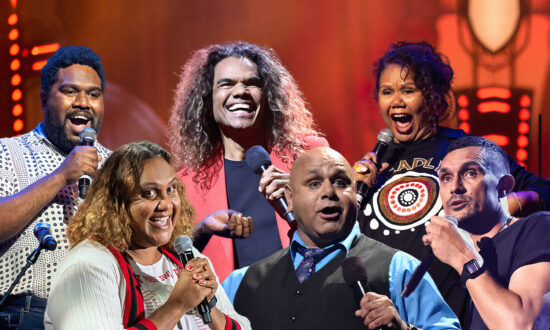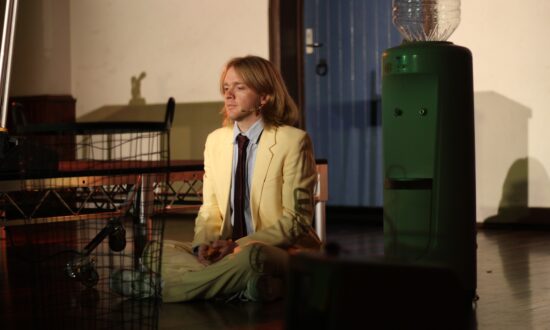Simone Avramidis and Chris Iley took ownership of the historic Goodwood Theatre and Studios in January of 2020. The couple – Iley with a background in venue management and Avramidis drawing on her significant experience as a theatre artist – had big plans for the city fringe space.
“We did a big risk management assessment [before we bought the building],” says Avramidis. “The only thing that we could foresee that would literally kick us right in the butt was if we didn’t have audiences coming to the theatre, and you’re like – ‘hold on, that’s not going to happen’.”
The first cases of COVID-19 were identified in Australia in late January 2020. Within two months, the pandemic had brought about Iley and Avramidis’ worst-case scenario.
Instead of being daunted, the pair have spent the last two and a half years innovating and adapting, always in service of keeping alive their ultimate goal.
“One of the big things that I’m particularly passionate about is… finding our community and really offering this space for artists and non-artists to come together,” says Avramidis. “They can meet other like-minded people and make networks and connections with people that they may otherwise not be able to make.”
They started out by launching a mid-year festival called COMEBACK, programming special one-off shows across genres including music, comedy, burlesque and theatre.
After COMEBACK proved successful with audiences in 2020, Avramidis branched out in 2021, programming specifically to reach audiences across the age spectrum. The youth momentum was building around the venue, so Avramidis approached Adelaide Fringe, looking for support to create a new pop-up space called Victoria Lane to host live music in the festival season.
“It was one of the easiest, most user-friendly application forms I’ve ever done,” says Avramidis. “And, to be honest, if we didn’t get the funding through the Fringe, we probably wouldn’t have been successful getting the funding through the [Unley] Council. We needed both.”
The impact of the funding investment was significant for the venue.
“Throughout the Fringe… from Thursday to Sundays, we created free live performances in the outside venue. It was incredible.

Simone Avramidis and Chris Iley.
“Without Victoria Lane, it probably wouldn’t have been half as successful for us. About 60 per cent-plus of our audience during the Fringe was under the age of 40.”
Adelaide Fringe has also emerged as an important revenue source in the calendar as the suburban venue has grappled with COVID’s effects.

The new owners of the Goodwood Theatre created their own laneway venue.
Cashflow from the festival season has joined with other reliable income streams – including from venue hires, events and resident companies – to create the capacity for Avramidis and Iley to support artists year-round.
“Emerging artists and even professionals that have maybe had a bit of time away… we want to offer them the opportunity to use the space on a daily, or weekly basis,” says Avramidis.
“We’re creating hot desks at the front for artists to be able to come in, not pay, just come in and use the desk, use our wi-fi, chat to us if you want to talk about some ideas.
“We’re actually running a little skill-share program. We don’t take any money for hiring the space, all the money directly goes to the artist who’s facilitating that workshop.”
Building sustainability in the venue has, for Avramidis, been as much about audiences and their local community as it has been about artists. When the venue is bustling, she sees it as part of a reciprocal relationship with the businesses in her immediate area and the other small theatres dotted around Adelaide’s inner suburbs.
On busy nights, Avramidis watches punters from nearby restaurants, dessert bars and pubs stop by the venue, or sees her customers head out to continue their night at one of her neighbours’ establishments.
With the recent closure of the iconic Bakehouse Theatre, venues like the Goodwood are even more necessary in creating welcoming spaces where art fits in as part of everyday life.
“If people go to Holden Street Theatres and have a great time, if they go to Rumpus and they have a good experience, then they might want to come to the Goodwood Theatre and have a good experience too,” she says.
“We’re all part of shifting this idea of theatre and actually making it accessible, and making it inclusive, so people feel like they’re part of something.”

Get InReview in your inbox – free each Saturday. Local arts and culture – covered.
Thanks for signing up to the InReview newsletter.
And as Avramidis points out, that’s a lot easier to do, especially during a global pandemic, with a little bit of support – from your neighbours, your audience, your artists, and from institutions like the local council and the Adelaide Fringe.
Goodwood Theatre will present its Winter Warmers weekend of live music on June 16-19.
The Business of Art is an InReview series about the development of performing arts careers and opportunities from Adelaide. The series has been produced with the support of Adelaide Fringe.
Read more of the series here.
Support local arts journalism
Your support will help us continue the important work of InReview in publishing free professional journalism that celebrates, interrogates and amplifies arts and culture in South Australia.
Donate Here




